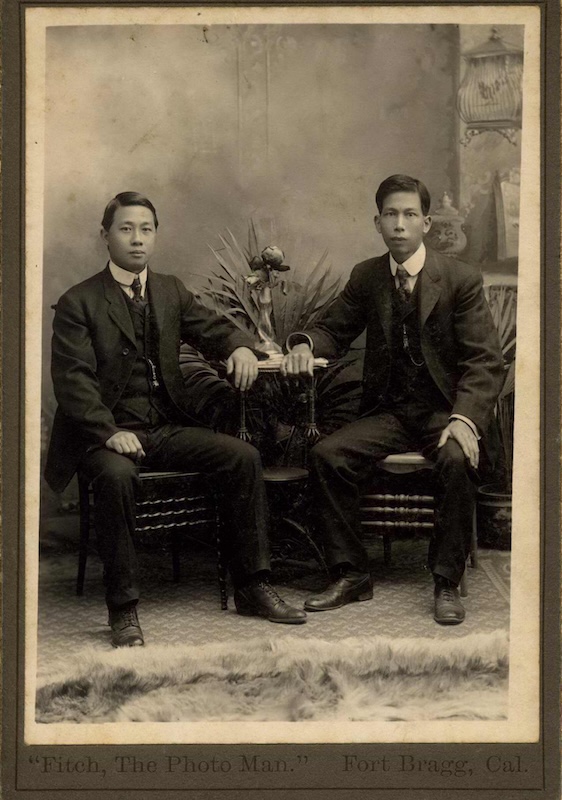
Look Tin Eli and his brother, Look Poong Shan, in a photograph taken at a Fort Bragg studio circa 1900. (Photographer: W. T. Fitch; Gift of Mrs. Archie Gordon in 1973)
With birthright citizenship everywhere in the news these days, it’s an opportune time to remember the local boy who set the first legal precedent in the process that led to the 1898 U.S. Supreme Court ruling affirming citizenship for children born in the United States.
Look Tin Eli was born in 1870 in the back of his father’s grocery store on Mendocino’s Main Street (kitty-corner from where Gallery Books is). He was sent to his father’s home in Guangzhou, China in 1879 so he could learn the language and become familiar with the culture. Three years later, the Chinese Exclusion Act was passed to bar most Chinese people from entering the country and ban them from becoming naturalized citizens.
Upon Look’s return to San Francisco in 1884, he was denied entry because he lacked the necessary paperwork prescribed under the 1882 act. At the time, birth certificates were not yet regularly issued in the U.S. and passports were rare. Look challenged the decision to detain him at Angel Island and won his case in the U.S. Circuit Court of San Francisco. The ruling by Justice Stephen Field enlarged upon the 14th Amendment to the U.S. Constitution, which had been adopted in 1868 to grant citizenship and equal rights to African Americans and emancipated slaves with the umbrella phrase: “all persons born or naturalized in the United States.” Field declared that children born in U.S. jurisdictions are citizens regardless of ancestry.
Look went home to his family in Mendocino, where he attended the Big River Township public school. In 1888, when he was 18, he graduated from the intermediate division, which was equivalent to 6th grade nowadays. Thereafter, he worked in his father’s grocery store and, when his father died in 1894, he and his brother, Look Poong Shan, inherited the store and ran it. At about the same time, Look began his association with import-export businesses in San Francisco and undertook a few working trips back to China. In time, Look established the first Chinese-American bank in San Francisco, had a large hand in the resurrection of Chinatown after the 1906 earthquake, and started a steamship company that carried goods between the U.S. and China. His was a Chinese-American success story.
The Kelley House Museum is open from 11AM to 3PM Friday through Sunday. To speak with the curator about anything historical, contact her at curator@kelleyhousemuseum.org to make an appointment. Walking Tours of Mendocino are available throughout the week; the cost is $25. Visit the Kelley House Event Calendar for a Walking Tour schedule.